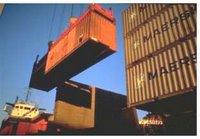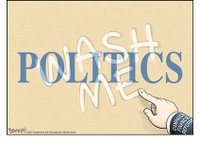Bush insists outsourcing to India has its benefitsBy Jim Puzzanghera
Mercury News Washington Bureau WASHINGTON - To people in Silicon Valley and around the country concerned about the outsourcing of jobs to India, President Bush on Wednesday offered something to make the practice more palatable.
Pizza.
It's just one of the U.S. products that India's rapidly growing middle class is developing an appetite for, Bush said in a speech to the Asia Society as he prepares for a trip to India and Pakistan next month. While acknowledging the individual trauma of Americans who lose jobs when companies move operations abroad, Bush said India's economic growth is an overall plus for the U.S. economy. ``India's middle class is buying air-conditioners, kitchen appliances and washing machines, and a lot of them from American companies like GE and Whirlpool and Westinghouse. And that means their job base is growing here in the United States. Younger Indians are acquiring a taste for pizzas from Domino's, Pizza Hut,'' Bush said to laughs from the audience at a Washington hotel. ``Today, India's consumers associate American brands with quality and value, and this trade is creating opportunity at home.''

Outsourcing is a delicate issue for the Bush administration. Its top economic adviser came under fire in 2004 for calling it ``just a new way to do international trade,'' comments that Democrats often cited during the presidential campaign as evidence Bush didn't care about workers. Bush acknowledged the difficulty of the outsourcing debate Wednesday. ``It's true that a number of Americans have lost jobs because companies have shifted operations to India. And losing a job is traumatic. It's difficult. It puts a strain on our families,'' he said. But instead of responding with ``protectionist policies,'' Bush said the United States needs to improve education and job training for displaced workers.
Commentary:
I am always astonished, it’s a Sisyphean stigma, when the ruling class (our elected officials) make a speach such as the President's address in India. Perhaps my delimited view is a result of a stubborn persistence that We the Rabble live in an egalitarian society. I find this reality evaporating; vanishing like the antiquated wisdom of our fathers who would "never work without a contract". Truth is heavier than fiction and the real the truth, the new reality, is that of inequality. It is the reality of a separate but parallel universe for the ruling minority and the work-a-day majority; seperate but not equal. This fact, that Washington is out of touch, is descending into my conscienceness, slowing and deliberately, with the same dauntless advance as the Condi Rice oil tanker cutting through the open seas. Yes, I am committing the cardinal sin. I am bringing up the old class warfare beef. But with a ruling class completely disconnected from the average citizen, it is an appropriate squawk.
The president of the United States, perhaps the figure head of a new American Oligarchy, is seeking support for Offshore Outsourcing, and tariff free trade. Free Trade, as some call it, is the new religion of the wealthy elite. And like most religious movements there is a lofty degree of superstition. While addressing the Indian Parlement, President Bush stated, "`India's middle class is buying air-conditioners, kitchen appliances and washing machines, and a lot of them from American companies like GE and Whirlpool and Westinghouse. And that means their job base is growing here in the United States" However, most of the facorty jobs with these corporate giants are being created in China, not the U.S. So really, who is benefiting from Free Trade?
Since the year 2000 the US economy has experienced a net loss in good paying manufacturing jobs. The entire job growth from then to now is in service-providing industroies, primarily credit intermediation, health care, waiters, waitresses and bartenders, and state and local government and finally, retail sales. Manufacturing in the United States has lost 2.9 million jobs, almost 17% of the manufacturing work force. This wipeout is in very large scale and not a single manufacturing payroll classification has created a new job catagory The declines in some manufacturing sectors have more in common with a country undergoing saturation bombing during a war than with a super-economy that is "the envy of the world." Writes Paul Krugman (Secretary of Labor Under the Reagan Administration). He continues, "Communications equipment lost 43% of its workforce. Semiconductors and electronic components lost 37% of its workforce. The workforce in computers and electronic products declined 30%. Electrical equipment and appliances lost 25% of its employees. The workforce in motor vehicles and parts declined 12%. Furniture and related products lost 17% of its jobs. Apparel manufacturers lost almost half of the work force. Employment in textile mills declined 43%. Paper and paper products lost one-fifth of its jobs. The work force in plastics and rubber products declined by 15%. Even manufacturers of beverages and tobacco products experienced a 7% shrinkage in jobs"
The knowledge jobs, specifically the IT Sector, that were supposed to take the place of the lost manufacturing base in the "new economy" appeared for a brief time, but now are threatened by Offshore Outsoucing - another scheme which places the American worker in direct compition with the wages of the third world. The information sector lost 17% of its jobs, with the telecommunications work force declining by 25%. Even wholesale and retail trade lost jobs. Despite massive new accounting burdens imposed by Sarbanes-Oxley, accounting and bookkeeping employment shrank by 4%. Computer systems design and related lost 9% of its jobs. Today there are 209,000 fewer managerial and supervisory jobs than 5 years ago. We are losing our shirts so that we can purchase cheap shirts. Yet, the only beneficiaries in this trade imbalance are the Share holders, the CEO’s and our so called leaders in Washington. As data gathered in the real world of worker insecurity and instability continues to show, an expanding U.S. trade deficit will likely hit $700 billion this year (up 100 billion from last year).
Meanwhile a great wailing is heard from the Defenders of Free Trade. Their libertarian economic faith is immune to facts. Their new secular religion who’s god is capital and CEO’s the high priests (Supermen - with the infalabililty and supposed efficiency Niche would admire) is re-making our world to fit their want. Their deciples, the Economists, like evangelical preachers, can be seen on the ubiquitous financial television broadcasts, telling us that "all is well, not to worry, these are normal growing pains". Our politicians ask us to align ourselves with this movement while they vilify those who oppose the new world order with rhetoric like, "obsturdtionist" and "protectionist!" Let's face it, no one likes a label, so we aquiesse.
However, this new religion requires us to believe, it requires faith, not just complatency. I t requires our cooperation. This is our strength, our only strength. The superstition and ignorance that its adherents resort to, the falsehoods to defend its dogma, are weak and penatrible. Our elected officials, asleep as they are to our needs, must hear from us about these economic conditions. Corporations controll the purses, but we controll the elections. I urge you to
contact Congress and demand that we walk away from the trade agreements (NAFTA, GATT, WTO, CAFTA) that facilite these corrupt policies. If our government can divorce itself from the Keoto Treaty and the Anti Balistic Nuclear Weapons Treaty, then we can abandon the trade agreements which are destroying our economy.
Your silence is their strenght.





















